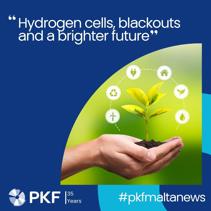Hydrogen cells, blackouts and a brighter future
Author: George Mangion - Senior Partner at PKF Malta
Published on Malta Business Weekly: 10th August 2023
In the EU there is an ambitious plan to reach net zero by 2050. Everyone acknowledges that the Green sector also creates jobs, makes electric grids more resilient, expands energy access in developing countries and helps lower energy bills. All of these factors have not contributed to a renewable energy dream taking root in Malta.
Citizens were given hope as many studies were commissioned over the decade, only to have whetted an appetite for low carbon emissions. Regrettably, the spirit was willing but the body was weak.
In 2019, Malta was at the bottom of the table in terms of the share of electricity coming from renewable energy. Eurostat reveals we are much of a laggard compared to others since we only generated 8% when compared to the average 34% of the EU.
At the lower end of the scale, the share of electricity from renewable sources was (8%), Cyprus, Luxembourg (10%) and Hungary (10%). The target plan for EU is to become the world’s first climate-neutral continent by 2050, an admirable objective behind the European Green Deal.
Remember how Donald Trump had ridiculed “climate change” and walked out of the Paris Agreement signed in 2015. Unbelievably, this report reads like an indictment of humanity’s stewardship of the planet. Many recall reading how in the past scientists believed that limiting global warming to two degrees Celsius above mid-19th century levels would be enough to safeguard our future.
This target was enshrined in the 2015 Paris Agreement, adopted by nearly 200 nations who vowed to collectively cap warming at “well below” two degrees Celsius, and 1.5 degrees if possible. Stark reality shows that when analysing current trends, the target seems to be heading for three degrees Celsius at best. How can we define climate change?
Simply put, this will fundamentally reshape life on Earth in the coming decades, even if humans can tame planet-warming greenhouse gas emissions, according to a landmark draft report.
Many studies show how renewables can be an effective solution to reach carbon neutrality. Renewables could supply four-fifths of the world’s electricity by 2050, generate hydrogen via electrolysis, massively cutting carbon emissions and helping to mitigate climate change. But solar and wind power have to be fully integrated, with sustainable bioenergy, hydrogen fuel cells (apart from the innovative use of ammonia as a fuel) providing another key part of the mix.
All this means speeding up innovation in business and technology. In simple terms, it means the planet needs to start taking collective action to promote renewable energy before it is too late. How is Malta faring in this quest?
During the past decade, Castille focused solely on maximizing an investment in a modest wind farm project in Montenegro. So far, Malta operates a grid system, which is fragile, as it has seen patch work repairs and parts of the distribution cable still in use hails since colonial times. The extensive blackouts experienced last month has angered consumers, including hotels, restaurants and industry managers that had to send staff home, hurt tourist business while many threw away tons of refrigerated stock.
Obviously, most will agree that a constant supply of power is a pre-requisite for a healthy and flourishing economy with unprecedented population growth. Equally fighting climate change and reducing carbon footprint will be essential if we care to achieve net zero by 2050.
The trophy in going green is claimed by Austria, which in 2019 had more than 79% of electricity consumed generated from renewable sources. Certainly, the new hobby horse is hydrogen fuel technology. Some criticise that the EU Green strategy is not as revolutionary as it may seem when it concerns hydrogen, only lip services given to reduce the use of fossil fuels. Without any doubt, apart from nuclear power, the use of green hydrogen is the best option for the decarbonisation of the energy system.
One cannot label hydrogen fuel as a panacea as there exist challenges to translate this revolutionary concept into a commercial reality with proper regulation for the global market of transport, shipping and aviation.
Author: George Mangion - Senior Partner at PKF Malta
Published on Malta Business Weekly: 10th August 2023
Get in touch: info@pkfmalta.com

